|
|
|
Sort Order |
|
|
|
Items / Page
|
|
|
|
|
|
|
| Srl | Item |
| 1 |
ID:
099889
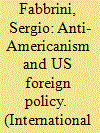

|
|
|
|
|
| Publication |
2010.
|
| Summary/Abstract |
From the end of the Cold War in 1991 to the end of the 2000s, anti-Americanism has passed through different phases in Europe, as well as in other parts of the world: it was modest in the 1990s, it exploded between 2003-2008, then declined after 2008. Although anti-Americanism continues to be rooted in many political cultures and experiences, its emergence in the post Cold War era seemed to be correlated to a United States foreign policy-making process unrestrained by either domestic or international institutions. When domestic and international multilateral checks have been unable to keep under control the exercise of US international power, then anti-Americanism has functioned as a sort of last resort critic on the latter. Anti-Americanism has seemed to be the reaction, more than to controversial foreign policy's decisions, to their unchecked elaboration and unilateral implementation. For world public opinion, the legitimacy of the foreign policy-making process counts more than the latter's outcomes.
|
|
|
|
|
|
|
|
|
|
|
|
|
|
|
|
| 2 |
ID:
099893


|
|
|
|
|
| Publication |
2010.
|
| Summary/Abstract |
This article explores and criticizes key assumptions of contemporary cosmopolitanism, not least the notion of post-sovereignty, trying to understand how the cosmopolitan power and sovereignty critique may be very compatible with present-day reconfigurations and relegitimizations of state power and sovereignty. Through a critique of how cosmopolitans sketch out a problematic nation state's past and a more factual efficient and morally appropriate post-nation state condition the article claims that cosmopolitanism may come to serve as legitimizing cover for a new sovereigntist language and practice wielded by the same powers who were dominant in the nation state age, namely the Western states. The purpose of the article is to ask whether cosmopolitanism and humanitarianism have become the new sovereigntist language uniting state officials and state-critical scholars?
|
|
|
|
|
|
|
|
|
|
|
|
|
|
|
|
| 3 |
ID:
099895
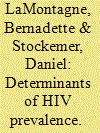

|
|
|
|
|
| Publication |
2010.
|
| Summary/Abstract |
Slightly over 25 years since the identification of the virus, Human Immunodeficiency Virus/Acquired Immune Deficiency Syndrome (HIV/AIDS) epidemic has killed millions of people and has expanded to become one of the greatest dangers in the world, threatening individuals, economies, communities and states. To better understand the factors underlying the wide discrepancies in HIV rates across countries, and to better prioritize interventions in the global fight against HIV/AIDS, it is imperative to build sound models that help to identify determinants of worldwide HIV prevalence. While scholars of various disciplines such as political science, anthropology and health studies have engaged in this endeavor, these studies have found divergent results. Seeking to construct a viable model, this current study examines nine theory-informed variables - income inequality, regime type, gender equality, GDP per capita (PPP), control of corruption, per cent Muslims in a country, education, contraceptive use and availability of antiretroviral medication that potentially affect a state's HIV prevalence. This research finds that conditions favorable to a decrease in HIV are low income inequality, a high per cent of Muslims in a country's population and high contraceptive use.
|
|
|
|
|
|
|
|
|
|
|
|
|
|
|
|
| 4 |
ID:
098851


|
|
|
|
|
| Publication |
2010.
|
| Summary/Abstract |
Daniel Deudney's impressive reformulation of republican security theory has rightly garnered a great deal of attention from scholars of international politics. However, a close examination of Deudney's theory reveals that it rests on a series of weaknesses. His defense of a novel form of world state depends on a one-sided interpretation of state sovereignty according to which it functions chiefly as a protective device against external foes, an idiosyncratic rereading of modern republican theory and the US framers, and a highly tendentious view of US history. Notwithstanding his noteworthy attempt to break free from the insularity of US political and intellectual life, Deudney reproduces some elements of it.
|
|
|
|
|
|
|
|
|
|
|
|
|
|
|
|
| 5 |
ID:
099892
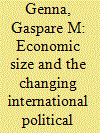

|
|
|
|
|
| Publication |
2010.
|
| Summary/Abstract |
Why are some free trade agreements (FTAs) in the western hemisphere successfully negotiated and implemented while others seem to stagnate during negotiations? FTAs are more likely to develop when there is an asymmetrical power relationship and potential partners are satisfied with projected trade patterns. The European Union (EU) and United States have been successful in negotiating agreements with the Caribbean and Central American (CCA) countries. However, current bilateral and multilateral trade talks between the EU, the Common Market of the South (MERCOSUR), and United States are at a standstill. Although all four sets of trade negotiations include dissatisfactory conditions for the Latin American countries, the two negotiations with the CCA countries were successful completed, but the two involving MERCOSUR countries have not. These results are partially due to two factors: the economic size differential between the CCA countries and MERCOSUR vis-à-vis the EU and United States, and MERCOSUR's growing economic ties with China. MERCOSUR's medium-size economy and ties with China allows it to forgo FTAs with the EU and United States until more favorable conditions are met. However the CCA countries' immensely smaller size and economic ties with China do not allow for such abstention.
|
|
|
|
|
|
|
|
|
|
|
|
|
|
|
|
| 6 |
ID:
098848


|
|
|
|
|
| Publication |
2010.
|
| Summary/Abstract |
This article engages with the latest (post-Cold War) debate about the theory and practice of nation building (state building). This is linked to a discussion of the shift in US foreign policy towards Afghanistan relative to Iraq between late 2008 and late 2009. Afghanistan is currently a major focus of nation building efforts and counter-insurgency programs led by the United States of America. Meanwhile, the discussion here ranges from South Vietnam to Colombia, Iraq and Afghanistan, and explores some of the ghosts that now haunt the US presence in Afghanistan 9 years on from the start Operation Enduring Freedom at the end of 2001. We argue that the possibility of successful nation building in Afghanistan is both far-fetched and far-off. In fact, what is required is the reorientation and reduction (even termination) of Washington and its allies' direct commitment to Kabul. Washington and its allies should focus on a grand strategy for the Middle East and Asia that attaches far less importance to Afghanistan. This should occur in the context of understanding the history of the emergence, universalization and contemporary crisis of the nation-state system. Nowhere are the limits of the nation-state system and the failure of nation building more apparent today than in Afghanistan. In this context a whole new approach to questions of war, peace and progress is in order. The comprehensive elaboration of a new security-development framework is beyond the scope of this article, but we conclude by elaborating some of the main elements of a new framework: this will include a point of departure for research and policy to move beyond the current crisis of the nation-state system and nation building.
|
|
|
|
|
|
|
|
|
|
|
|
|
|
|
|
| 7 |
ID:
098852
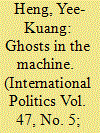

|
|
|
|
|
| Publication |
2010.
|
| Summary/Abstract |
Where ideas such as the 'End of History', 'Globalisation' or a 'New World Order' once animated the academy, recent debates within International Relations (IR) seem indicative of an emerging sea-change in intellectual trends. Scholars are now mooting instead a 'Return of History', the 'Return of Authoritarian Great Powers', the 'Return of Realism', the 'Resurgence of geopolitical competition' and even a 'Replay of the Great Game'. The resurrection of these so-called 'traditional' concepts raises an intriguing question: is the study of IR continually plagued by concepts that refuse to go away? This article begins by reviewing the intellectual historiography of IR, demonstrating that heralds of a 'new dawn' have repeatedly encountered the stubborn lingering presence of 'old' assumptions. The article then proceeds to analyse how the philosophical metaphor of a 'ghost in the machine' can help elucidate these peculiar intellectual quirks of IR, before concluding by contemplating the possibility of eventual 'exorcism'.
|
|
|
|
|
|
|
|
|
|
|
|
|
|
|
|
| 8 |
ID:
099891
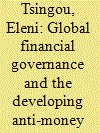

|
|
|
|
|
| Publication |
2010.
|
| Summary/Abstract |
The developing anti-money laundering (AML) regime exhibits a specific, non-financial set of policy preoccupations. Yet it is important to examine AML from a global financial governance perspective as the regime essentially imposes controls on the movement of money. This article analyses the political, institutional and regulatory evolution of the regime and argues that it serves to address a need for action on a diverse set of public policy goals (corruption, drug trafficking or terrorism); to relieve financial centres in advanced economies from offshore competitive pressures; and, unintentionally, to shape private sector practices so as to consolidate the position of key market institutions. The article stresses that the achievements with respect to its goals remain modest at best in relation to its ambitions, while important side-effects raise concerns about its role, efficiency and legitimacy. It also examines the possibility that AML has been tacitly accepted as the price for capital mobility.
|
|
|
|
|
|
|
|
|
|
|
|
|
|
|
|
| 9 |
ID:
099896
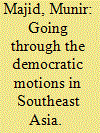

|
|
|
|
|
| Publication |
2010.
|
| Summary/Abstract |
In Southeast Asia there is rising expression of the right to be heard to address grievance or to change policy of government in a desired direction. Although this might have been ignored in the past, by repressive means if deemed necessary, it has become increasingly difficult to push back or aside the wave of such views that today find convergence in a marketplace that engages a global constituency of shared ideas facilitated by civil society organizations and, most importantly, by information and communication technology (ICT). There is a distinction that needs to be made between fulfilment of the principles and practices of liberal democracy on the one hand, and activism in the 'democratic process' on the other, the latter comprising at the one end participation in a large marketplace of expression of views and at the other an experience of concentrated new forms of securing support in electoral contest. It must be borne in mind the principles and institutions of liberal democracy could be absent or limited in the political system, and yet there may be animated activity in the digital sphere of a truncated democracy. Such intense activity in the new media could still come to be dominated by the ruling rich and powerful who already control the conventional media.
|
|
|
|
|
|
|
|
|
|
|
|
|
|
|
|
| 10 |
ID:
098850
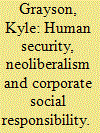

|
|
|
|
|
| Publication |
2010.
|
| Summary/Abstract |
Mainstream critiques of human security theory and practice have criticized how human security is being conceptualized, with a specific focus on how the absence of a precise and universally accepted definition hinders its practical application. Rejecting these critiques as an explanation for the policy failures of human security agendas, this article argues that the difficulties experienced in operationalizing human security lie in the myriad ways human security policies have revealed themselves to be subordinate to an existing, well-established and equally diffuse policy agenda: neoliberalism. The specific case study examines Canada, a prominent member of the human security vanguard, and its unwillingness to regulate transnational corporate conduct that contributes to human insecurity.
|
|
|
|
|
|
|
|
|
|
|
|
|
|
|
|
| 11 |
ID:
099894
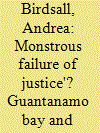

|
|
|
|
|
| Publication |
2010.
|
| Summary/Abstract |
This article considers challenges to the existing international human rights regime in the post-9/11 era. It uses an interdisciplinary approach that brings together issues of politics and law by focussing on international legal provisions and setting them into the context of International Relations theory. The article examines the establishment of Guantanamo Bay as a detention centre for suspected terrorists captured in the 'war on terror' and focuses on violations of international human rights and humanitarian law in the name of national security. This article demonstrates that the wrangling over Guantanamo Bay is an important illustration of the complex interaction between interests and norms as well as law and politics in US policy making. The starting point is that politics and law are linked and cannot be seen in isolation from each other; the question that then arises is what kind of politics law can maintain.
|
|
|
|
|
|
|
|
|
|
|
|
|
|
|
|
| 12 |
ID:
099890
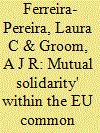

|
|
|
|
|
| Publication |
2010.
|
| Summary/Abstract |
This article assesses the effective meaning, scope and implications of intra-Community solidarity in the security and defence area. It touches on the genealogy of the conception of solidarity and its various interpretations as well as both the tensions this entails and impediments this creates for development of a common security and defence policy. It concludes that political solidarity has been gradually taking root on the basis of a common shared modus vivendi, although not without embarrassing setbacks. Military solidarity is more than a mirage but not yet a firmly based reality given the existence in the European Union of distinct foreign and security policy identities shaped by traditionally defined national interests that still dominate intergovernmental cooperation in the area.
|
|
|
|
|
|
|
|
|
|
|
|
|
|
|
|
| 13 |
ID:
098849


|
|
|
|
|
| Publication |
2010.
|
| Summary/Abstract |
Despite a rich volume of scholarship on strategic culture and security, scant attention has been paid in such studies to explore the representations of strategic cultures and insecurities in international politics. To address this lacuna, I follow in this article a critical constructivist reading of strategic culture and insecurity, with an eye at examining some of its conceptual, theoretical and analytical premises, which, despite incorporating how various aspects of strategic cultures define security choices, have shared the realist notion of anarchy as given in international politics. In doing so, I offer a critical constructivist analysis highlighting the socially constructed nature of and the mutually constitutive relation between the representations of India's strategic culture, statist identity, insecurities and nuclear policies. Drawing from my case study, I conclude by offering some suggestions along a critical constructivist line to conceptually, theoretically and analytically broaden the existing understandings of strategic cultures and states' security practices.
|
|
|
|
|
|
|
|
|
|
|
|
|
|
|
|
|
|
|
|
|